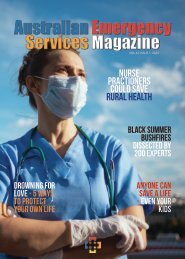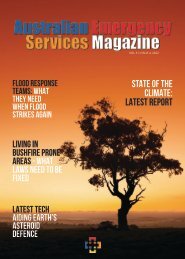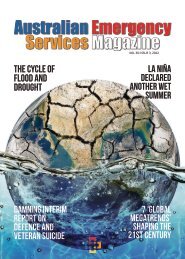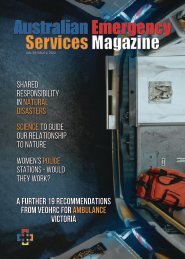Vol. 13 Issue 3. 2019
• Latest Events • Emergency Law with Prof. Michael Eburn • Friendships & Career in the Emergency Sector • Technology changing Police Surveillance • Natural Disasters & Mental Health • Click image to read more......
• Latest Events • Emergency Law with Prof. Michael Eburn • Friendships & Career in the Emergency Sector • Technology changing Police Surveillance • Natural Disasters & Mental Health • Click image to read more......
Create successful ePaper yourself
Turn your PDF publications into a flip-book with our unique Google optimized e-Paper software.
In many migrant families, children or<br />
young adults have the best knowledge<br />
of English in the family and so are<br />
often called upon to be the interpreter.<br />
The use of underage interpreters<br />
raises further ethical issues as they<br />
are tasked with interpreting sensitive<br />
health information about a loved one.<br />
So caution is needed when using<br />
family members as interpreters.<br />
How can the use of interpreters be<br />
increased and improved?<br />
There are some key actions that<br />
should be taken to improve healthcare<br />
experiences and outcomes<br />
for people with limited English<br />
proficiency.<br />
First, training for both interpreters<br />
and health-care professionals is<br />
essential to develop skills for effective<br />
collaboration.<br />
Second, there should be additional<br />
time allocated for appointments<br />
where interpreters are used. This<br />
is because each sentence must be<br />
said twice during the exchange of<br />
information and time is needed for<br />
briefing and debriefing about the<br />
session.<br />
Third, health services need to collect<br />
accurate information to determine<br />
whether an interpreter is needed. A<br />
person may present with functional<br />
English but still require an interpreter<br />
for ease of communication given<br />
the complex terminology and the<br />
seriousness of medical conversations.<br />
And finally, professionally trained<br />
interpreters must be available in the<br />
languages and dialects required. There<br />
are more than 300 languages spoken<br />
in Australia and many have multiple<br />
dialects.<br />
Investment in interpreting services<br />
is essential to ensure the provision of<br />
equitable, high quality health care to<br />
all Australians. In a country where<br />
interpreters may improve care for one<br />
quarter of the population, we can’t<br />
afford not to.<br />
Article first published on The Conversation<br />
Sarah Verdon<br />
Research Fellow and Senior Lecturer<br />
in Speech and Language Pathology,<br />
Charles Sturt University


















